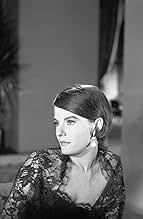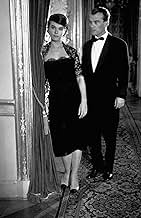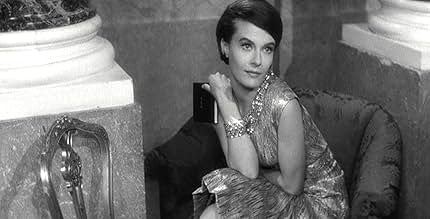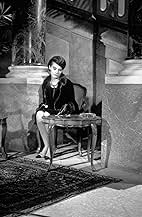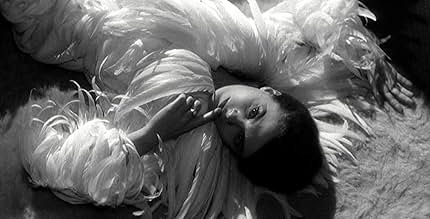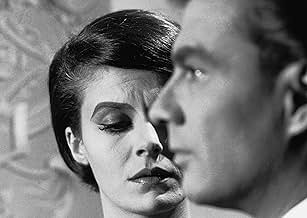L'année dernière à Marienbad
- 1961
- Tous publics
- 1h 34min
Dans un château isolé, des personnes sans nom évoluent au sein une ambiance mystérieuse. Un homme dit à une femme qu'ils ont eu une liaison l'année dernière, peut-être à Marienbad. Elle ne s... Tout lireDans un château isolé, des personnes sans nom évoluent au sein une ambiance mystérieuse. Un homme dit à une femme qu'ils ont eu une liaison l'année dernière, peut-être à Marienbad. Elle ne s'en souvient pas.Dans un château isolé, des personnes sans nom évoluent au sein une ambiance mystérieuse. Un homme dit à une femme qu'ils ont eu une liaison l'année dernière, peut-être à Marienbad. Elle ne s'en souvient pas.
- Réalisation
- Scénario
- Casting principal
- Nommé pour 1 Oscar
- 2 victoires et 5 nominations au total
- Un personnage de l'hôtel
- (as Karin Toche-Mittler)
- Un personnage de l'hôtel
- (as Davide Montemuri)
- English Introduction
- (non crédité)
Avis à la une
There has been many conjectures as to the subject and the plot. Well, if you want a good hint, let me give you a precious one: read the novella "La Jalousie" (Jealousy, 1957), by Alain Robbe-Grillet, who is also the screenwriter of "Marienbad". "La Jalousie" is the thematic and "ideological" inspiration for "Marienbad".
Robbe-Grillet (one of the top names of the French "Nouveau Roman" movement along with Nathalie Sarraute, Marguerite Duras, Michel Butor, etc), was a former agronomist/ mathematician (and his writing shows it) who became a writer/filmmaker with a very personal, geometrical, unemotional, descriptive style. The novella "La Jalousie", like most Nouveau Roman books, is essentially cinematic in their approach of characters and plot, functioning like a film camera, a non-opinionated unobtrusive observer, but insightfully revealing in its "detachment".
His novella "La Jalousie" is a fascinating, maze-like circular construction, in which beginning and end mingle many times over, each time from a different perspective, just like observing a house or a sculpture from different angles one at a time -- which means each angle is only partially accurate, revealing but a portion of the truth, while hiding another. The "observer/narrator" in the book (the husband, but written in the third person - "he") tries to locate in PLACE and TIME the precise moment in which the feeling of jealousy arises in him as he tries to find the extent of his wife's relationship with another man (a.k.a. the threesome in the film). Did an affair really happen? Is it yet going to happen? Or is it his imagination, his suspicion, just his jealous feeling? (btw, this is the same theme as Proust's incomparable masterpiece "La Prisonnière", treated in antipodal, totally psychological, but equally obsessive style).
As in most "Nouveau Roman" novels, the notion of TIME in "La Jalousie" (and also in "Marienbad") is transformed and deformed; the approach of the characters is non-psychological, meaning that thoughts and outbursts of emotion are not dealt with, only the description of places, words, gestures and actions. Everything (even a very strong feeling like the birth of jealousy) is apprehended only through the observation of external facts: small gestures, the position of a chair or a table, a glass found full or empty, an unexpected sound, the way the woman combs her hair or looks at herself in the mirror, a suddenly unusual way of getting up or sitting down which leads to the husband's perception that something has suddenly, dangerously, definitely changed.
Well, it made very much sense to me that language-experimentalist book-worm Alain Resnais (think of all of his movies which were based on literature) and his fascination with memory and the brain (think "Hiroshima Mon Amour", "Je t'Aime Je t'Aime" and "Mon Oncle d'Amérique") should venture in constructing this film in visual terms using the geometrical structure of the novel (hence the breathtaking serpentine camera movements), with no beginning or end, respecting its "external", non-psychological, non-motivational approach of the characters and the plot, never condescending to "explanations".
See the film and read the book! I'm sure that, if you've liked (or been baffled by) the film on a first viewing, you'll have many insights on a second viewing of this absorbing, totally fascinating movie after reading the book on which it is structurally/esthetically based. While it's not essential to do so, it could be kind of a bonus! What else can I say? A definitive, revolutionary, undisputed film classic - 10/10
When it comes to cinema, I'm neither a philistine nor a scholar. I'm happy to read into a film's artistic context in preparation for watching it, but it must be self-evident, and not reliant upon anything but its own merit and communicability to be considered a success. In practice, this means I will certainly read the hype, but I won't necessarily believe it. And it's a good job, because "Last Year at Marienbad" remains one of the most hyped, discussed and debated movies of all time. People disagree over virtually everything about it - the pace, the narrative structure, the individual performances, the pretense, even the plot points. Yes, that's right, after forty-eight years people still argue over what actually happens in this film, let alone what it all means and how successfully it is presented to us. So I decided to ignore the minefields of audience opinion (which is largely positive anyway, if wildly diverse) and dive in without fuss, volunteering to watch this movie from the 'philistine' end of the spectrum and if I didn't like it, screw it. It's only one film anyway.
When it became clear what I was watching, and how many traditional storytelling criteria were obviously not going to be fulfilled by "...Marienbad", I felt like I had burst in to the film's aristocratic country retreat wearing torn jeans and waving a bottle of tequila around, but ended up having an awesome time in a completely unexpected way. Make no mistake, I thoroughly enjoyed this movie. It is a near-perfect realisation of a very, very dense and ambitious concept, and Resnais should be proud that he and his film-making team were able to make it. It is stately, baffling, elegant, sinister and brilliant.
Not that I could tell you what it's actually about, of course. Most people seem to think it's about the tricks and subjective nature of the memory, and the inherent flaws in how we cross-reference events with other events over time. These broad, elemental themes are the only ones I feel sure enough about to include in this review, which is illustrative of "Last Year at Marienbad"s disorienting effect. We are taken on an endless stroll through the rooms and corridors of a cold, strange country manor where the upper classes take their holidays and engage in card games and theatre. Their discussions are empty and meaningless, yet they go on forever. Time is not present in a recognisable form as the unnamed narrator loses track of how long he has been there, and how long he has attempted to persuade the unnamed woman that they met before, and that she had promised to run away with him. "Wait for one year," she'd supposedly said. "Next year I will leave with you." But the woman has no memory of him or her promise. She appears to be married to another man, who is tall, dour and imposing. Despite this, she keeps the unnamed narrator at arm's length, drawing him in and then pushing him back as if she does indeed remember something of him but is unwilling to accept it. His struggle to awaken some kind of acknowledgement of their shared past is the premise of the film.
"Last Year at Marienbad" is a bizarre maze of half-recollections and inaccuracies, where words and events are repeated several times in different situations and everything we see is very possibly on an endless loop, eventually folding in on itself and collapsing into a kind of incomprehensible singularity. We have no frames of reference for what we are seeing other than what has already been seen, and we are never to know what's 'now' and what's a memory because the characters cross over between the two. As a result I found myself trying to draw a line between reality and false memory up to about half way through the film, after which I abandoned it as a futile exercise. This is one of its key strengths - it demands so much of the viewer that we are forced to build a structure for it in our own heads, and our efforts are routinely dashed.
This all sounds terribly oblique and ridiculous, and in a sense it is; its detractors have regularly labelled it as such and that's a valid conclusion to reach. But it is spectacular on the eye, and this carried my attention right through the difficulties and to the end of the movie without so much as a pause. The camera sweeps down hallways and bursts out across garden terraces without even a jolt, it literally dances its way through the film as if it were another character. There are odd touches, too, that contribute to the striking atmosphere of the film, like Resnais' decision to have his supporting actors and extras remain completely static until they are speaking or in the company of the main three characters. He also skillfully breaks the pace by accelerating towards several shuddering climaxes in the last half of the film, which renew the viewer's attention and string us further along towards an ending that we hope will allow us something more definite to grasp.
Whether it does or not, I will withhold. It's one of the many reasons to watch this film. But beware, it is genuinely challenging viewing – and in fact, its esotericism is the only reason I won't rate this higher than I have.
So - Last Year At Marienbad, in a nutshell, assume French Accent:
Verse 1: Man: I know you. Woman: You do not know me. Man: We were here. Woman: I was never here. Chorus: Man: Long strange monologue about the place that they are at, Marienbad. And how he has been here before and how she has been here before. Camera: panning about the ornate Marienbad mansion. Verse 2: (repeat verse 1 - add very interesting game of pick-up sticks) Chorus repeat verses 1 & 2
I think everyone should see this film. I don't know why. I have seen it numerous times. No, I have never seen it. Yes, I saw it last year! No, last year I did not see it. Yes, I saw it here, with me. Wait, I'm alone. Who am I talking to?
Le saviez-vous
- AnecdotesThe match game in the movie is named as "Nim". In order to win the game there is only one tactic including a system called "Nim Sum". If both players use this tactic perfectly, then the owner of the first move will eventually lose. Due to the same reason, it is always disadvantageous to start the game first.
- GaffesExterior night scenes were shot day-for-night, but the sky and reflections of it were allowed in the frame, and they appear as bright white instead of black. This may have been intentional to emphasize the surreality of the film.
- Citations
[X wanders through the hotel's corridors cataloging items he sees]
X: Empty salons. Corridors. Salons. Doors. Doors. Salons. Empty chairs, deep armchairs, thick carpets. Heavy hangings. Stairs, steps. Steps, one after the other. Glass objects, objects still intact, empty glasses. A glass that falls, three, two, one, zero. Glass partition, letters.
- ConnexionsFeatured in Fejezetek a film történetéböl: A francia új hullám (1990)
Meilleurs choix
- How long is Last Year at Marienbad?Alimenté par Alexa
Détails
- Date de sortie
- Pays d’origine
- Site officiel
- Langue
- Aussi connu sous le nom de
- Last Year at Marienbad
- Lieux de tournage
- Sociétés de production
- Voir plus de crédits d'entreprise sur IMDbPro
Box-office
- Montant brut aux États-Unis et au Canada
- 207 917 $US
- Week-end de sortie aux États-Unis et au Canada
- 15 485 $US
- 20 janv. 2008
- Montant brut mondial
- 223 111 $US
- Durée
- 1h 34min(94 min)
- Couleur
- Mixage
- Rapport de forme
- 2.35 : 1



